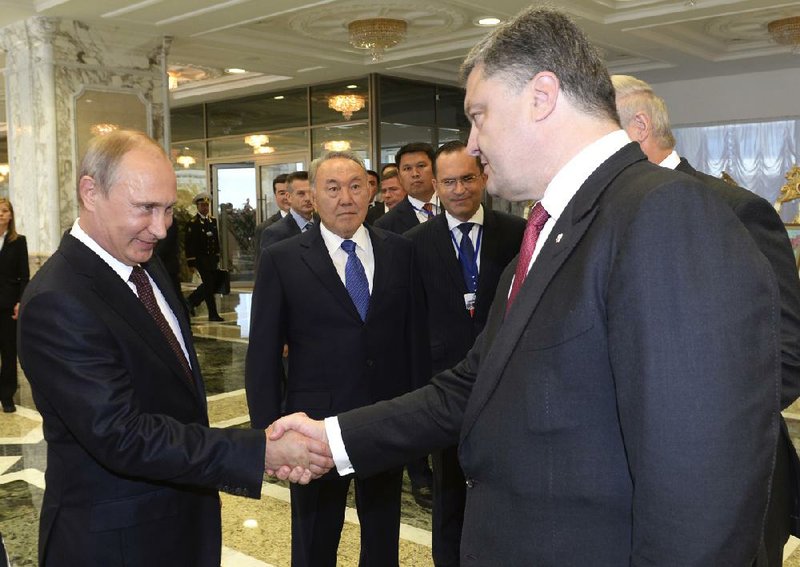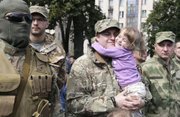MINSK, Belarus -- Ukrainian President Petro Poroshenko said early today that he has support for a peace plan from leaders who attended a summit in Minsk, including Russian President Vladimir Putin, the Interfax news agency reported.
But there were no indications that would mean an immediate end to the fighting in eastern Ukraine between pro-Russia separatists and Ukrainian forces in which about 2,000 civilians and more than 700 Ukrainian troops have died.
Putin said he had an "overall positive assessment" of Tuesday's meetings, which included face-to-face talks with Poroshenko.
In addition to their one-on-one meeting, Putin and Poroshenko met in a general session meeting with the presidents of Kazakhstan and Belarus and top European Union officials.
Poroshenko said on Twitter after the talks that Russia, Belarus and Kazakhstan backed a Ukrainian peace strategy to stem battles between his army and the pro-Russia insurgents who have sought to break off the Donetsk and Luhansk regions in the nation's east. He didn't elaborate on what the plan entailed, and Putin didn't mention it as he addressed reporters.
"Russia, for its part, will do everything for this peace process," Putin said after the meeting.
But Putin said he was not involved in any discussion of a cease-fire in Ukraine because Russia is not a party to the conflict. Moscow has been accused by Kiev and the West of arming and supporting the rebels -- a charge the Kremlin denies.
Meanwhile, Ukraine's anti-rebel operation said on its Facebook page Tuesday that 10 soldiers from a Russian paratrooper division were captured Monday around Amvrosiivka after crossing the border from Russia.
Ukraine's posting included videos of five of the men. The men gave their names and military serial numbers and said they had been sent to Ukraine by their superiors after initially being told they were going on a training exercise.
One, who identified himself as Sergei Smirnov, said they were not told anything about their mission.
"We were just traveling through fields and then we stopped in the middle of the field and the BMP2 [armored vehicle] broke down," he said.
Asked if he knew they were on Ukrainian territory, he said: "When we got into the village we saw a tank with Ukrainian flag. Then we understood." He said they then came under fire.
In another video released by Ukraine, a man identified himself as Ivan Milchakov, a member of a Russian paratroop regiment from Kostroma, north of Moscow.
He said he "did not see where we crossed the border" into Ukraine and had been told he was being sent on "a 70-kilometer march over three days," a distance of about 43 miles.
RIA Novosti, a state-controlled Russian news agency, quoted an unnamed source from the Russian Defense Ministry as saying the men had crossed into Ukraine by accident.
"The soldiers really did participate in a patrol of a section of the Russian-Ukrainian border, crossed it by accident on an unmarked section, and as far as we understand showed no resistance to the armed forces of Ukraine when they were detained," the source said.
Putin did not directly address the allegations that Russians had crossed into Ukraine but suggested the soldiers simply had become lost.
"Ukrainian soldiers have found themselves on our side, too," he said.
The summit Tuesday began with a stiff and awkward handshake between Poroshenko and Putin, their first meeting since a brief encounter at a D-Day remembrance ceremony in June.
Belarusian President Alexander Lukashenko said the talks at the summit were "tough," but stopped short of saying they had failed.
"Sadly, the situation there [in Ukraine] has gone so far that in the absence of agreements in principle, any steps or technical accords are not going to lead to settlement," he said.
The tensions in Ukraine began when Poroshenko's pro-Moscow predecessor, Viktor Yanukovych, backed out of signing an economic and political pact with the European Union in November, igniting bloody protests that toppled Yanukovych's government in February.
Tensions between Ukrainians in the country's west who want closer ties with Europe and those who favor traditional ties with Russia sparked an insurgency in the east and Russia's annexation of the mainly Russian-speaking Crimean Peninsula in March.
Poroshenko said Tuesday that the purpose of the talks in Minsk was to start searching for a political compromise, and he promised that the interests of Russian-speakers in eastern Ukraine would be taken into account.
"The fate of peace and the fate of Europe are being decided in Minsk today," Poroshenko said in his opening remarks.
In his opening statement, Putin argued that Ukraine's decision to sign an association agreement with the 28-nation EU would lead to huge losses for Russia, which would then be forced to protect its economy. Russia had been counting on Ukraine joining a rival economic union it is forming with Belarus and Kazakhstan.
Ukraine is set to ratify the EU association agreement in September.
Putin also said the conflict "could not be solved by further escalation of the military scenario without taking into account the vital interests of the southeast of the country and without a peaceful dialogue of its representatives."
Ukraine wants the rebels to hand back the territory they have captured in eastern Ukraine, while Putin wants to retain some sort of leverage over the mostly Russian-speaking region so Ukraine does not join the EU or NATO.
Russia has called frequently for Ukraine to federalize -- devolving wide powers to the regions from the central government in Kiev. Poroshenko has resisted that move, but he could agree to give the regions some expanded powers. Poroshenko also has spoken against holding a referendum on whether Ukraine should join NATO.
In Ukraine on Tuesday, the fighting had expanded to a new front: the area around the city of Novoazovsk, strategically positioned on roads linking Russia with Crimea.
Towering columns of smoke rose Tuesday from outside the city in Ukraine's far southeast after what residents said was a heavy artillery barrage, and Ukraine accused the separatists and Russia of trying to expand the conflict.
In Kiev, Col. Andriy Lysenko, a spokesman for Ukraine's National Security Council, blamed the shelling Tuesday on "Russian mercenaries."
"Russia is trying from its side to open a new front," Lysenko said.
Russia reportedly has tens of thousands of troops positioned in areas near the Ukrainian border, leading to persistent concerns that Moscow could be preparing an invasion.
Lysenko said there were enough forces and equipment in Mariupol to defend the city of more than 450,000.
Tuesday was the second straight day that attacks were reported in the vicinity of Novoazovsk, which previously had seen little fighting.
Ukraine said a small column of Russian tanks and armored vehicles crossed into Ukraine on Monday north of Novoazovsk, raising the possibility that pro-Russia separatists were aiming to take control of a strip of land that would link Russia with Crimea.
Geoffrey Pyatt, the U.S. ambassador to Ukraine, expressed alarm about the incursion on Twitter.
"The new columns of Russian tanks and armor crossing into Ukraine indicates a Russian-directed counteroffensive may be underway. #escalation," he wrote.
U.S. and Ukrainian officials have said they are increasingly concerned that Russia is orchestrating a counteroffensive to reverse recent gains by Ukrainian forces.
"Russia's military incursions into Ukraine -- artillery, air def systems, dozens of tanks & military personnel -- represent significant escalation," Susan Rice, President Barack Obama's national security adviser, wrote in a Twitter post.
Information for this article was contributed by Nataliya Vasilyeva, Peter Leonard, Jim Heintz, Laura Mills and Lynn Berry of The Associated Press; by Andrew Higgins and Michael R. Gordon of The New York Times; and by Ilya Arkhipov, Aliaksandr Kudrytski, Daryna Krasnolutska, Volodymyr Verbyany and Ewa Krukowska of Bloomberg News.
A Section on 08/27/2014


